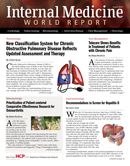Publication
Article
Internal Medicine World Report
Don't Count Us Out Just Yet
Author(s):
The Ebola epidemic in Central Africa has riveted the American public. Press accounts of the homegrown case of a Liberian man who developed symptoms after arriving in Texas has driven anxiety higher. There is growing fear among many that the virus will spread rapidly in the US causing widespread death. This week a patient advised me to stock up on food and water and get a gun to prepare for the impending epidemic.

Simon Douglas Murray, MD
Editor-in-Chief
The Ebola epidemic in Central Africa has riveted the American public. Press accounts of the homegrown case of Liberian man who developed symptoms after arriving in Texas has driven anxiety higher.
There is growing fear among many that the virus will spread rapidly in the US causing widespread death. This week a patient advised me to stock up on food and water and get a gun to prepare for the impending epidemic.
Somehow the media-fueled frenzy and general level of fear this has created is reminiscent of the AIDS epidemic. Actually it was herpes that came first, but beginning in 1983, the fear of herpes was overshadowed by new concerns about AIDS. At that time we didn’t really understand how AIDS was transmitted, we had no treatment, and people did die from horrible complications.
Some thought you could get it from mosquitos.
Others proclaimed that AIDS was God’s way of punishing society for a corrupt life style. Once diseases take on a religious overtone all rationally is lost. In the early months of the epidemic, being from the country of Haiti meant that people were suspected of having the virus. The true risk factors of course were practicing a homosexual life style, injecting drugs, and receiving blood transfusions. People shunned AIDS patients thinking that they could get sick just by being around them. Many years later we regard AIDS much like many chronic diseases like diabetes which follows a protracted course with periodic complications. An early death from AIDS is not the usual outcome anymore. We have learned that treatment outcomes in underdeveloped countries are just as robust as in developed countries. So much for the fear that AIDS would wipe out civilization.
Fear-mongering has a way of catching on.
The Population Bomb was a best-selling book written by Stanford University Professor Paul R. Ehrlich and his wife, Anne Ehrlich, in 1968. It warned of the mass starvation of humans in the 1970s and 1980s due to overpopulation, as well as other major societal upheavals, and advocated immediate action to limit population growth. Fears of a "population explosion" were widespread in the 1950s and 60s, but the book and its author brought the idea to an even wider audience. It was an interesting theory but it just wasn’t true. The authors had no way of knowing that a technologic explosion in growing food would occur so that American farmers began to produce far more food than we could consume. Famine has not been eliminated, but its root cause has been political instability, not global food shortage. In nations with democracy and a free press people have never suffered from extended famines. It also turns out that Western countries have very slow rates of growth-- in fact in some countries negative growth. If US didn’t have as many immigrants as it does, our population would be declining. China has reversed its policies of limiting its population size because of a perceived shortage of future workers. Unfortunately the birthrate in underdeveloped countries continues to rise, particularly in Arabic countries where populations are growing rapidly.
Public hysteria was high at the end of the war in Vietnam. Many people predicted that once South Vietnam was defeated, Asian countries would fall one by one—the domino theory. Eventually, the argument went, the world would succumb to communism. It was that thinking that got us into the war in the first place.
Anti-war protests included rioting in American cities. An, entire generation of Americans was disenfranchised and decided to “turn on and tune out” with drugs. The US inflation rate rose to almost, 20 %. The world had thousands of nuclear weapons so that our mutual destruction was assured many times over.
Even before the Viet Nam conflict, it was common for people to build bomb shelters, many of which still exist.
Personally, I could never have predicted that 16 years later I would be standing in the middle of Alexanderplatz with thousands of Germans chipping away pieces of the Berlin Wall to take home as a souvenir, or that the USSR was on the verge of disintegration.
Despite the disenchantment of the Viet Nam era, Most of my hippy friends grew up and became teachers, bankers, doctors, musicians, politicians. After the war, the economic policies of the Reagan administration brought the U.S. economy back to life, and inflation dropped steadily.
Ten years ago we the US faced a looming shortage of oil and natural gas. It was felt that going forward there would be wars to decide who got the little remaining supply of oil and gas that existed. We were told we would need to clear cut huge forests to provide fuel for our furnaces and stoves which in turn would pollute the earth. In 10 short years our ability to extract oil and gas advanced rapidly. Better methods of discovering oil deposits and more efficient wells have made the United States the largest oil producing country in the world. Natural gas is plentiful which has driven down prices nearly two thirds. Recently Saudi Arabia announced that it was not going to cut their production of oil in order to bolster prices because they would rather maintain their cash flow even at the expense of a lower cost per barrel of oil. They recognize that the competition for customers has suddenly gotten more intense.
The latest fear is that the earth will warm rapidly causing massive changes in weather patterns, widespread flooding because of the melting ice caps and will lead to the end of life as we know it today. People who don’t agree with the science are called “deniers” and have little place in the debate on global warming. Indeed there is credible science to support the notion that this is indeed a possibility. Just as likely is the possibility that we are in a temporary cycle of erratic weather, and slowly rising temperatures which has nothing to do with burning coal and oil. I suspect that within a decade this will no longer be an issue.
Today I will occasionally lament that medicine has changed so much for the worse and that I dread getting old and dependent upon the medical system. I have heard from my peers that young people don't have the same commitment to medicine that older physicians have. They complain that residency programs are too watered down and pamper future doctors so that they never are seasoned.
Dire predictions are everywhere: Obama care will bankrupt Medicare. Medicine as we know it will disappear. Truthfully, this crisis didn’t begin yesterday; it probably has been brewing for 20 or more years. It’s just that we become tolerant to increasingly greater intrusions into how we practice and have permitted the slow undoing of what we believe to be good medicine. At the end of the day I suspect this too shall pass. Yet, there is reason to believe that good medicine has not suffered a knockout blow. More advances in medical technology have occurred in America during the past decade than in all other countries combined. Physician salaries may have declined in real terms but I don’t know of any doctor who is starving, or who collects unemployment. Our average salary is at least twice that of regular working people, and we even have a job that most of like most of the time. The fact that it brings great personal satisfaction and benefits society is just an added bonus.
Medicine has made real advances. The complication rate from diabetes has been declining despite increased numbers of diabetics, and the death rate from heart disease has fallen every year for the past 20 years. People are living longer lives. As turns out the US longevity rate would probably be among the highest in the world if violent death and car accidents were eliminated from the statistics. No doubt we have many challenges, including world poverty, wars being fought on virtually every continent, and a sense that our political system is failing us. (Actually this is not new, in the 1800s Mark Twain was quoted as saying that politicians were like soiled diapers because they needed to be changed often and for the same reason.)
I have no doubt that when the problems become big enough we'll put our heads together and come up with solutions. American ingenuity combined with the ideas of the best thinkers around the world, will find solutions for the things that threaten our survival. Winston Churchill once wrote about us that "you can always count on Americans to do exactly the right thing after they exhaust every other possibility."






